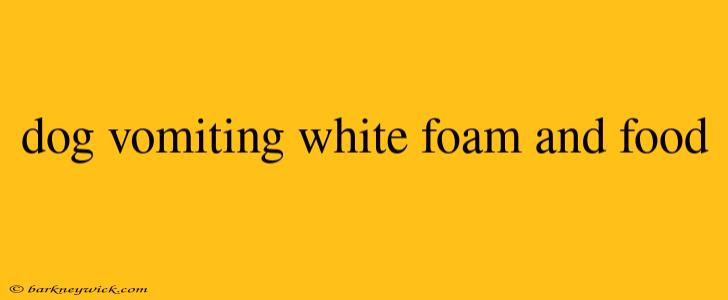Why Is My Dog Vomiting White Foam and Food? Understanding the Causes and Solutions
Remember that time I was out on a walk with my dog, Max, and suddenly, he stopped in his tracks, looked at me with those big puppy-dog eyes, and promptly vomited a white foamy mess all over the sidewalk? Let me tell you, it wasn't pleasant, and I was instantly worried. Luckily, it turned out to be a simple case of overeating, but it taught me the importance of understanding the various causes behind dog vomiting, especially when it involves white foam and undigested food.
In my opinion, dog vomiting is a common issue, and it can be alarming for any dog owner. However, it's crucial to remain calm and assess the situation. The presence of white foam and undigested food in vomit often points towards issues like overeating, dietary indiscretion, or even underlying medical conditions.
Understanding the Causes:
- Overeating: Just like humans, dogs can get a bit too enthusiastic with their food and end up with an upset stomach. This is especially true for puppies who are still learning their limits.
- Dietary indiscretion: Dogs are notorious for scavenging and eating things they shouldn't. This can range from scraps of food left on the floor to things like socks or plastic.
- Gastrointestinal upset: This is a common cause of vomiting and can be triggered by things like stress, changes in diet, or even parasites.
- Motion sickness: Some dogs are prone to getting car sick, which can lead to vomiting.
- Underlying medical conditions: In some cases, vomiting can be a symptom of more serious conditions like pancreatitis, intestinal blockages, or even cancer.
Important Facts and Research:
- According to the American Kennel Club, overeating is one of the most common causes of vomiting in dogs.
- A study published in the Journal of Veterinary Internal Medicine found that dietary indiscretion was responsible for approximately 20% of canine vomiting cases.
- If your dog is vomiting frequently, experiencing other symptoms like lethargy, diarrhea, or weight loss, it's essential to consult a veterinarian, as these could be signs of a more serious health issue.
Helpful Tips and Advice:
- Monitor your dog's diet: Ensure they are eating a balanced and appropriate diet for their age and breed.
- Feed them smaller meals throughout the day: This can help prevent overeating and reduce the risk of vomiting.
- Avoid feeding them table scraps: Stick to their regular dog food and limit their access to food that could be harmful.
- Keep a clean and tidy environment: Dispose of any potential hazards that could be ingested like trash, plastic bags, or small toys.
- Consider a car sickness medication: If your dog is prone to motion sickness, talk to your vet about medications that can help prevent vomiting during car rides.
Entity: American Kennel Club (AKC): The AKC is a non-profit organization dedicated to advancing canine sports and responsible dog breeding. They provide a wealth of information about dog health and care, including resources on dog vomiting.
Remember, it's always best to consult a veterinarian if you're concerned about your dog's health. They can help you diagnose the cause of the vomiting and recommend the appropriate treatment plan.
In conclusion, while seeing your dog vomit can be unsettling, it's often a sign of a temporary and treatable issue. By understanding the common causes, taking preventative measures, and seeking professional help when necessary, you can help keep your furry friend healthy and happy. Just like Max learned his lesson about overeating, your dog can too, with a little help from you.
